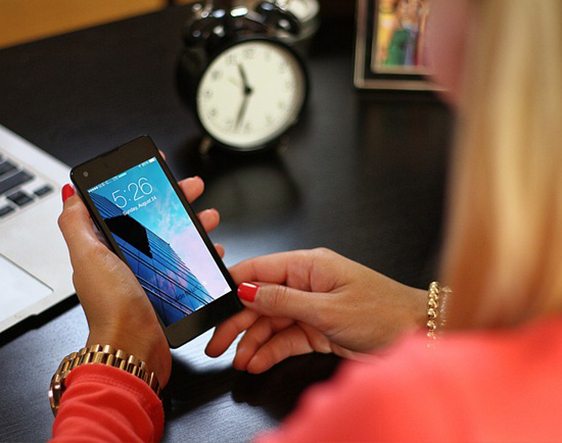Whether you’re glued to your iPhone, addicted to your tablet or crazy about your computer, there is no denying that we’re a nation obsessed with technology. But just how addicted to tech are we?
Research1 by bed and sleep specialist, Time4Sleep, reveals just how in love we are with our phones and how this is affecting us in the bedroom. The study discovered that, although 73 percent of Brits claim they are able to sleep without their phone within their hand’s reach, 66 percent also admit that they sleep with their phone next to them; which suggests that we may be somewhat in denial, as a nation, when it comes to our phone habits. The top five reasons Brits take their phones to bed have been revealed as: For use as an alarm in the morning (58 percent); In case of an emergency (52 percent); To check the time in the middle of the night (25 percent).
In case they wake up in the night and can’t get back to sleep (18 percent); In case they are burgled during the night (15 percent). The research also revealed the social apps that are keeping Brits awake at night. Respondents admitted that the last social app they have open before nodding off are: Facebook (33 percent); Email (15 percent); YouTube (8 percent); Text messaging (7 percent); WhatsApp (7 percent). It turns out that age does make a difference when it comes to social apps too. People aged 18 – 24 are most likely to have Instagram open as the last app before they go to sleep (21 percent), whereas Facebook proves to be most popular for people aged 35 – 34 (42 percent). For those aged 65 and above, email was found to be the most popular social app (29 percent).
For some Brits, it’s not just their quality of sleep that is affected by bringing their phone upstairs either, 10 percent of Brits also admitted that having a phone in the bedroom affects their relationship with their partner too. When asked about this, many people said that they talk less, don’t pay each other enough attention, are too distracted by their phones and can even end up arguing because of it. People aren’t just struggling to leave their phones out of the bedroom either, 34 percent of respondents also admitted that they even take their phone to the bathroom with them, proving that ‘phone anxiety’ is a real problem for Brits. The study also revealed the top five professions that are most likely to sleep in the same bed as their phones too: HR (62 percent); Lawyer (54 percent); Doctors and nurses (49 percent); Artist/designer (45 percent); Director/owner (38 percent).
Jonathan Warren, Director at Time4Sleep, said: “Our research findings reveal some rather shocking trends about how our technology habits are affecting our lifestyles. It seems that, as a nation, we are addicted to technology but it is important to ensure that our phones do not have a negative impact on our lives. “It’s interesting to see HR professionals are the most guilty of sleeping in the same bed as their phones as a previous study2 we carried out discovered that 93 percent of HR professionals admit that they are kept awake at night thinking about work too. It’s definitely clear there is a link between technology and not being able to switch off from work and although it can be hard to leave your workload in the office, it’s important we try and make our homes a stress free environment. “If you think your quality of sleep, or your relationship, is being affected by your technology habits, it may be time to start making some changes. Introducing a tech ban, or just cutting down on your phone usage while in the bedroom, could really benefit you.”
www.time4sleep.co.uk/relaxation-zone/
1 Independent survey of 1,011 respondents by Time4Sleep in April 2017
2 Poll of 1,000 people carried out by The Leadership Factor in January 2017









